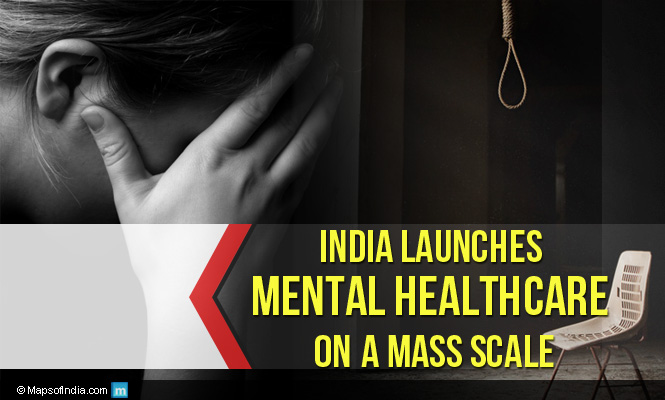A person’s health to a great extent depends on his mental health as well. Good mental health means a good sense of living, living with confidence and self esteem. A person in a good mental health means that he is being able to live life, enjoying it to the fullest extent, in spite of difficulties, and being able to appreciate his life, the people and the environment around. Most important of all, being in a good mental health means that you have the capability to face any odds and challenges in life with courage and make use of your abilities to your best. At every stage in life, mental health is important.
Urban mental health scenario in India
Mental health issue has so far been neglected in India. According to a report by the Indian Council of Medical Research (ICMR), every 10th person in urban India suffers from mental health disorders like anxiety, depression and schizophrenia. It is a strange fact that mental health problems are seen especially in States and cities where income is high like in Punjab, Kerala, Delhi, Mumbai. These are cases of educated people living in affluent pockets.
Strange are indeed the ways of nature. While we say that money is necessary to live in comfort and have a better life, it is this money which also causes mental health issues. Urbanisation provides advanced and better healthcare compared to the rural areas, but even then, the majority of mental health problems are seen among the urban people.
Increase in technology, mechanization and inactive lifestyles have been major factors leading to the increase in diseases among the better-off. In most cases, it is seen that the patients often starve themselves to death or become reclusive or commit suicide. And in many cases, it so happens that the patients do not get the timely treatment and their conditions become too severe to be cured. And there is also the social stigma attached where many feel that a person suffering from such problems means that he is mentally unstable and cannot face the society.
India’s first mental health policy
For the first time, the Government of India has taken steps to include mental health into public health programme, the Union Health Ministry now releasing India’s first official National Mental Health Policy, which is no doubt a Herculean task to implement. Of course, we had a National Mental Health Programme (NMHP) since 1982. However, there was a need of a proper policy considering the increasing dimensions of this problem in today’s world.
The mental health policy was formulated based on the resolution made at the 65th World Health Assembly held in Geneva in 2012, which emphasised the need for a comprehensive, coordinated global responses, considering the ramifications of the burden of mental disorders. This policy for its proper execution will be followed by a “Mental Health Action Plan 365”.
According to the World Health Organisation’s Mental Health Report of 2011, less than 1% of the total health budget is spent on mental health in India. Plus, India also lacks mental health professionals. According to the report, there is just one psychiatrist for every 3.4 lakh people. The policy aims to provide universal psychiatric care to the entire population.
Major highlights of the new policy
- More emphasis on funding: The new policy emphasises the need for more fund allocation in total health budget, including social welfare, school education and women and child development, so as to handle mental health appropriately for all. This is not expenditure as such but a social investment and a social right.
- Identifying vulnerable groups: The policy also emphasises that there are certain sections of the population who are more vulnerable to mental health issues, like as the urban people and they should not be discriminated against in the offering of services. It also includes people suffering from mental health among the poor, the homeless, people in custodial institutions, orphans, children, and the elderly, including sex workers or victims of human trafficking.
- Emphasis on care-givers: It is no doubt the first-hand treatment and care is given by family members. Considering this, the policy aims to give family members access to information and guided access to special services. It is stated in the policy, “The emotional and social costs of providing care for a family member with mental illness cannot be quantified but exacts a huge toll on families.”
- Promoting awareness on the problem of mental health: In addition to providing treatment, the policy also focuses on the need to create awareness among the people on this problem and how to prevent it, including training anganwadi workers and school teachers.
- The policy aims to decriminalise suicide: The policy also emphasises the need of setting up crisis intervention centres and appointing community leaders so that they can help in bringing down the rates of suicide in India. Most importantly, it also aims to decriminalise attempted suicide, which is at present considered as a punishable offence in India.
Funds for the programme
According to the 12th Five Year Plan, a budget of $88.4 million had been allocated for the National Mental Health Programme. Funding is important and not enough has been done for the treatment of psychiatric patients. Union Health Minister Harsh Vardhan, prior to the launch of the policy, had visited the Institute of Mental Health and Hospital in Agra, after which more funds have been allocated for expansion and modernisation of the hospital. He also promised that funds would be given to all hospitals to make them open psychological and psychiatric health care departments for treating patients.
The new policy will be backed up by the Mental Health Action Plan 365, which mentions specific duties for the Central Government, States, local bodies and civil society organizations.
Read More:
A Reality Check on State of Mental Health in India
Dignity in Mental Health
Suicides and the State of Mental Health Care in India
Psychiatric Treatment in India- A Taboo
Laws in Place to Prevent Harassment of Women, But of What Use!
Is Exam the sole factor causing stress among students in India?
Suicides and the State of Mental Health Care in India
Psychiatric Treatment in India- A Taboo
Is Exam the sole factor causing stress among students in India?
Book Review: An Insider’s View of Emotional Traumas
How to beat stress?
Parental Pressure and Stress on Children
Stress Busters Activities
Depression? Sure, You Can Come out of It





